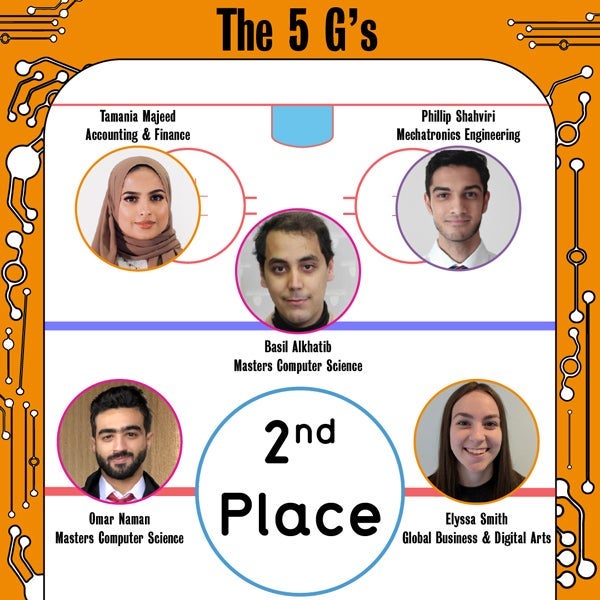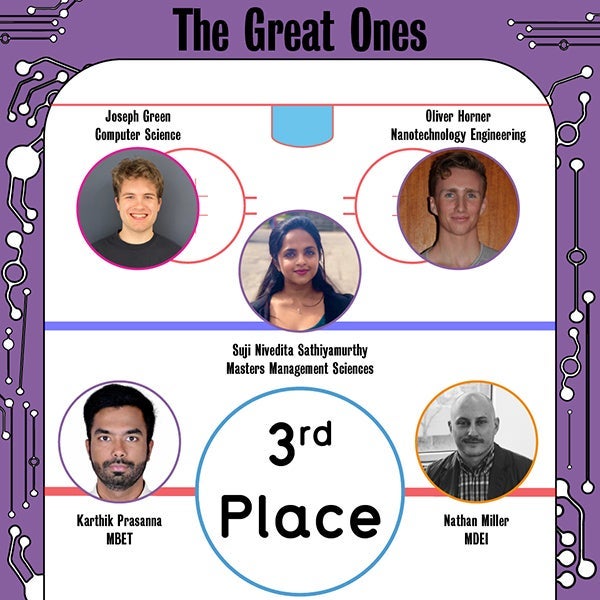With COVID-19 preventing hockey fans from watching games in person this year, the University of Waterloo, Rogers Communications, and Sportsnet are seeking new ways to enhance the experience of watching hockey from home. They recently partnered to host the Sportsnet Hockey Hack, a virtual hackathon that challenged Waterloo students to design applications using 5G technology to deepen and enrich fan engagement.
The event was led by Concept, the University of Waterloo’s student entrepreneurship program. According to Carly Cameron, Entrepreneurship Experience Manager at Concept, teams comprised of students from all six faculties had one week to meet each other, identify each other’s key skills and find a way to change sports viewership forever. Students used real datasets of NHL puck and player tracking from the 2020 Stanley Cup Playoffs and were mentored by industry leaders.
Students from the Cheriton School of Computer Science fared particularly well in the competition. All three winning teams included computer science students on their roster. We caught up with these exceptional students to find out why they participated, how they developed their concepts, and what they learned from competing.
First place: Game2

CS students on team: David Radke, PhD candidate • Rachel Li, 2A
Why did you participate?
David: I have played competitive hockey my entire life, and continue to play at the university level. I saw this hackathon as an opportunity to merge my two passions of hockey and computer science to develop something significantly important.
Rachel: I wanted to learn some fresh project ideas and collaborate with people that are also passionate about software development. I also wanted to work on a team with people in different roles and with different areas of expertise to learn more about teamwork.
What was your biggest takeaway from this experience?
David: My biggest takeaway was how much of the game can be captured by player tracking data. For someone who knows the game of hockey, it can be hard to picture the flow of the game and strategies from the perspective of someone who doesn’t know what they should be looking at. The technology implemented by the NHL is opening the door for more advanced analytics and helping grow the game to new audiences. Furthermore, this tracking data has the potential to open the door to new analytics that do not exist in any other sport through multiagent AI analysis.
Rachel: While too much stress can be bad for your mental health, a little bit of pressure can actually make you learn and build things at a speed you never imagined possible.
Second place: The 5 Gs

CS students on team: Omar Naman, Master’s candidate • Basil Alkhatib, Master’s candidate
What was one thing you learned from working with people from different disciplines?
Basil: It was interesting to see that students from other disciplines have decent knowledge in coding and in working with data. In a competition like this, finding a good idea and pitching it well is of great importance, so it was great seeing how business students would handle that.
Omar: Surprising ideas formed from merging the thought processes of teammates’ various backgrounds into a single product/idea.
What was your biggest takeaway from this experience?
Basil: I enjoyed listening to Rogers and Intel presentations about the technology they are developing and seeing its application in sports. I loved meeting new people and working with them for a whole week.
Omar: The most important skill for these types of events is finding a way to combine all the different aspects of a project that were discovered through ideating with the team.
Third place: The Great Ones

CS student on the team: Joseph Green, 3B
What was your biggest takeaway from this experience?
Joseph: Finding solutions that consumers truly want is paramount. While there were many ways we could have approached the Hockey Hack, what really made our product stand out was our ability to do customer research and translate that into a product people want.
What advice would you give to students who are considering participating in an event like this one but aren’t sure?
Joseph: Do it! There probably won’t be another chance to have access to people in the field and such interesting data, like the set provided by the competition.
There is no doubt that math and computer science are at the core of modern living! This is all the more reason why we are thrilled to see our students contribute their knowledge and skills to tackling current challenges in our society.
Kudos to all participating in this initiative and dedicating countless hours of work to something you were passionate about. You are a testament to the entrepreneurial spirit in the Cheriton School of Computer Science!